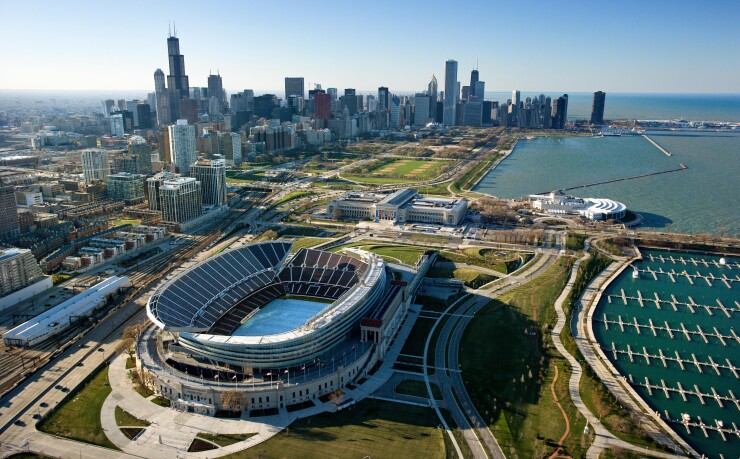Teams may go, but Illinois stadium authority bonds win an upgrade
6 min read

The legal structure backing debt issued by the Illinois Sports Facilities Authority outranks risks posed by the possibility of its two professional sports teams leaving, persistent shortfalls in its primary bond payment source and an escalating debt service schedule, according to rating analysts and investors.
The ISFA, which issued bonds for the two Chicago stadiums where Major League Baseball’s White Sox and National Football League’s Chicago Bears play, won a two-notch upgrade Aug. 29 from S&P Global Ratings. The move boosted the authority’s outstanding debt to BBB-plus from BBB-minus, lifting it higher into investment grade territory three years after the ratings agency knocked it to junk. The authority continues to face speculative-grade ratings from Fitch Ratings.
S&P’s upgrade reflects the management’s decision to request the full annual state hotel tax advance — the so-called “chairman’s certificate” — to cover debt service and hotel taxes returning to an upward trajectory following the pandemic-related decline, S&P said.
AdobeStock
The ISFA owns, operates and issued $150 million of bonds in 1989 for Guaranteed Rate Field where the White Sox play, and issued $400 million of 2001 bonds that financed the renovation of the Chicago Park District-owned Soldier Field, home of the Bears. About $416 million of debt is outstanding, nearly all of it for the 2003 Soldier Field renovation.
The bonds enjoy a complex but strong legal structure that analysts and bondholders said they believe will prevail despite headwinds facing the credit. Crucially, the bonds are not dependent on stadium activity for repayment.
“What an investor would have to ask themselves is whether they’re an investor because of the sports or because of the revenue stream,” said Dennis Derby, portfolio manager for the Global Fixed Income Research team at Allspring Global Investments, which holds just under $86 million of the ISFA bonds, some of which is insured.
“I’m looking at the legal structure — and I’m fairly comfortable with it. There may be some grumbling from the respective teams [about leaving], however that revenue stream should not change,” Derby said.
Under the legal structure backing the bonds, the state “advances” up to 60% of a 5% statewide hotel tax to the ISFA a few months ahead of the annual debt payment, an amount that’s sized in the chairman’s certificate. After making the debt payment, the agency must repay most of the state advance, using a local 2% tax on Chicago hotels as well as $5 million annual subsidies from the state and from the city.
If the Chicago hotel tax revenue falls short — which it has the last two years — the state is allowed to automatically withdraw the amount needed from the city’s share of income tax revenues that flow to what’s known as the Local Government Distributive Fund to cover the gap.
That means Chicago remains ultimately on the hook for the bond payments, a deal that former Chicago Mayor Richard M. Daley struck in 2001 to win support for the renovation of Solider Field.

S&P Global Ratings
The city’s hotel revenue proved sufficient in all years but 2011, until the COVID-19 pandemic hit in 2020 and drove a nearly 90% fall in local hotel revenue.
In 2020 and 2021, the authority dipped into its own $39 million special reserve and pushed off debt service through a scoop-and-toss restructuring to spare Chicago from having to cover the gap.
In 2022 and 2023, local hotel revenue fell short again, but the ISFA declined to refinance, leaving Chicago to cover the shortfall, which totaled nearly $30 million in 2022 and $9 million in 2023.
The fiscal 2024 budget included a chairman’s certificate advance request of $76.5 million, which covers the full debt payment.
The debt is set to mature in 2032. A current refunding is expected next year using existing state authority to push out the final maturity by one year to 2033, but new authority is needed for a more comprehensive solution, said ISFA Chief Executive Officer Frank Bilecki.
“If you look at the payments going forward and how they ramp to just over $90 million toward the end, versus where the hotel tax revenue estimates might be, we need to consider how we can solve for that issue so the [Local Government Distributive Fund] won’t get hit each year,” Bilecki said. “We have a number of bonds callable in 2024, so if there’s an opportunity to work with the General Assembly through the city and our partners on some kind of restructuring, that’s something that we would consider.”
Asking state lawmakers for the authority to stretch debt payments by five years or another type of restructuring would be a lobbying effort led by the city, Bilecki added.
“Obviously it’s something that alleviates pressure around the LGDF, but so far I don’t know whether this is going to fall into [new Chicago Mayor Brandon Johnson administration’s] Springfield priorities,” he said. “If this is a priority for them, great; if not, we deal with the LGDF.”
Chicago CFO Jill Jaworski formerly worked PFM Financial Advisors LLC, which advised on the authority’s 2019 and 2021 bond sales, so she is familiar with the credit and its pressures, Bilecki said.
With interest, ISFA owes $743 million of debt through 2032. Debt service this year totals $53.5 million and rises to $56.8 million next year. It hits $60 million in 2025 and $64 million in 2026 before holding steady at $67.5 million for three years. It then ramps to $78.6 million in 2030, $86.5 million in 2031 and $90.5 million in 2032.
The repayment schedule is tied to the 2033 expiration of the Bears’ Soldier Field lease. The team in 2022 announced it would leave the venue — the NFL’s oldest and smallest stadium — and reportedly can break its lease as early as 2026 for $84 million. Since the announcement, the team’s talks with potential hosts, like the suburb of Arlington Heights, seem to have cooled, and its future home remains unknown.
Three miles to the south, in August Crain’s Chicago Business reported that White Sox majority owner Jerry Reinsdorf is considering leaving Guaranteed Rate Field when the team’s lease is up in 2029. Like with the Bears, the debt tied to the stadium is set to mature at the end of the team’s lease.
If the teams were to leave, it would “weaken the overall revenue component, but it doesn’t disrupt the structure to repay the bonds,” said S&P analyst Geoffrey Buswick.
“It’s an interesting credit with a somewhat unique structure and now faces the unique challenge of both occupants of each stadium grumbling about possibly moving,” Buswick said. “Our view is the structure is more on hotel occupancy than stadium occupancy, so as long as the hotel revenue doesn’t face another COVID-like like pandemic and continues to be steady, then we see the structure remaining sufficient to pay the bonds through maturity.”
S&P’s 2020 downgrade came after the authority disrupted the structure by declining to request the full chairman’s certificate and instead dip into reserves to lessen the burden on Chicago, Buswick said.
“We viewed the use of reserves as upsetting the apple cart, upsetting the conservative nature of the original structure,” he said, adding that “now it’s been three years,” and the authority has returned to its tradition of asking for the full advance.
Fitch Ratings in June 2022 affirmed its BB-plus rating with a stable outlook.
The split rating has kept the bonds trading relatively cheap. A tranche of 5% Series 2019 bonds due in 2030 traded Tuesday for 102.5 with a 4.5% yield. That’s up from 98.8 with a 5.23% yield in November 2022, but well below 2021 prices of more than 120 and an initial offering pricing of 121.
Allspring’s Derby said he expects to see some tightening given S&P’s upgrade.
“Overall we’ve been pretty happy with the credit story,” Derby said. “Management has done a very good job of keeping bondholders informed, and they were receptive to speaking with us during COVID,” he said. “They maintained a level of openness that bondholders greatly appreciate and that’s definitely a positive.”







